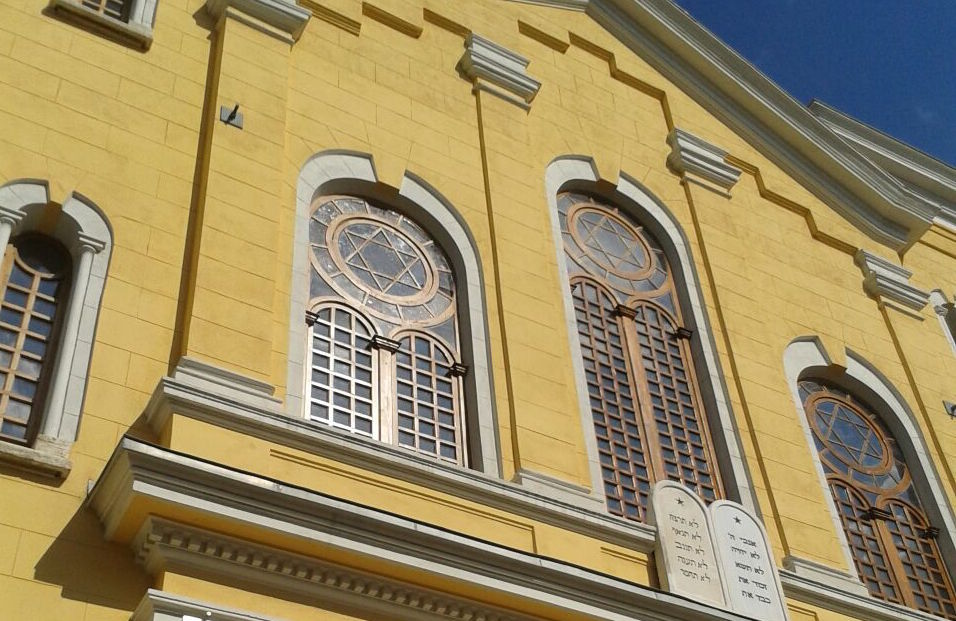
The restored Grand Synagogue of Edirne, Turkey, in August 2015. Photo Credit: Berkay Gulen.
My family moved to Edirne, an old city on the triangle of the Turkish-Greek-Bulgarian border, when I was almost seven years old. I still remember very clearly that I celebrated my seventh birthday when we were in transition and settling down in the visiting faculty housing of the local university. My memories of the city in the first year are somewhat blurry, but I still have vivid images of the Grand Synagogue of Edirne. In 1992, it was closed to commemoration and there were no worship services, but groups were coming from Istanbul and Israel in religious holidays. The most important feature of the synagogue, according to seven-year-old me, was its yellowish walls and Hebrew scripts.
During my elementary school years in the early 1990s, when I passed from the street of the Great Synagogue, I tried to imagine how the community would come together just ten years prior. This brainstorming might have been fed by my parents’ Jewish family friends, who are one of the few Jewish families that lived in Edirne in the 1990s. The Mitrani family, which has been living in the city almost 550 years, owned the only supermarket in Edirne. I always enjoyed the store because of the owner, Sara Teyze (Aunt Sara) and the market carts. Although her husband Rifat Amca (Uncle Rifat) could not speak Ladino, Sara Teyze was from Tekirdağ and learned the language from her grandma. “Sara is always interested in Ladino and her grandma used to speak with her and her sisters but she became fluent by traveling,” Mr. Mitrani told me when I asked him to interview for this article in the last weeks of 2015.
Edirne used to be an enclave for one of the biggest Sephardic communities of the Ottoman Empire in the beginning of the 20th century. The Great Synagogue was built in 1907 due to the edict of the Sultan Abdulhamit II after a large fire on September 2, 1905, which burned down 13 local synagogues. It was designed by France Depré and built by using the plans of Vienna’s Leopoldstädter Tempel, which was destroyed during the Kristallnacht in 1938. However, the Trakya Pogroms, Varlık Vergisi (Welfare Tax) and finally the foundation of Israel dramatically reduced the city’s Jewish population in the 1930s and 1940s.
In the late 1990s, there left only two Jewish families in the city; and today, only one Jew lives in Edirne. At the beginning of the 2000s, there were discussions that the restoration of the Grand Synagogue would be held by the local university when the negotiation between Turkish General Directorate for Foundations and the Rabbinate in Istanbul went on. However, the roof and walls of the building were severely diminished while a decade passed and none of the state institutions started the restoration. Once I had left Edirne, I continued to hear from the synagogue through my mom. She was telling how Sara Teyze also moved from Edirne to join her daughters in İstanbul, and the local institutions were still negotiating which one would be responsible for the restoration of the synagogue.
Finally, the restoration was started in 2010 and the Grand Synagogue reopened on March 26, 2015, after 48 years of disrepair. Edirne’s Jewish community that spread to İstanbul and Israel also met in the first commemoration. The Jewish quarter was full of relatives and old friends like Rifat Mitrani’s childhood companions. While the community in the 1990s numbered almost 60 people, Mr. Mitrani says that only five young couples had been living in Edirne on those years. “We preferred to send our children to İstanbul for better high school education and then parents joined children and moved to İstanbul when the Jewish population was getting older. Thus, it was predictable that I would be the only Jew of Edirne after 20 years.” Mr. Mitrani also adds that although his wife lives with his children in İstanbul for ten years, he loves his job and never thinks of moving: “I love this city and want to stay close to my ancestors.”
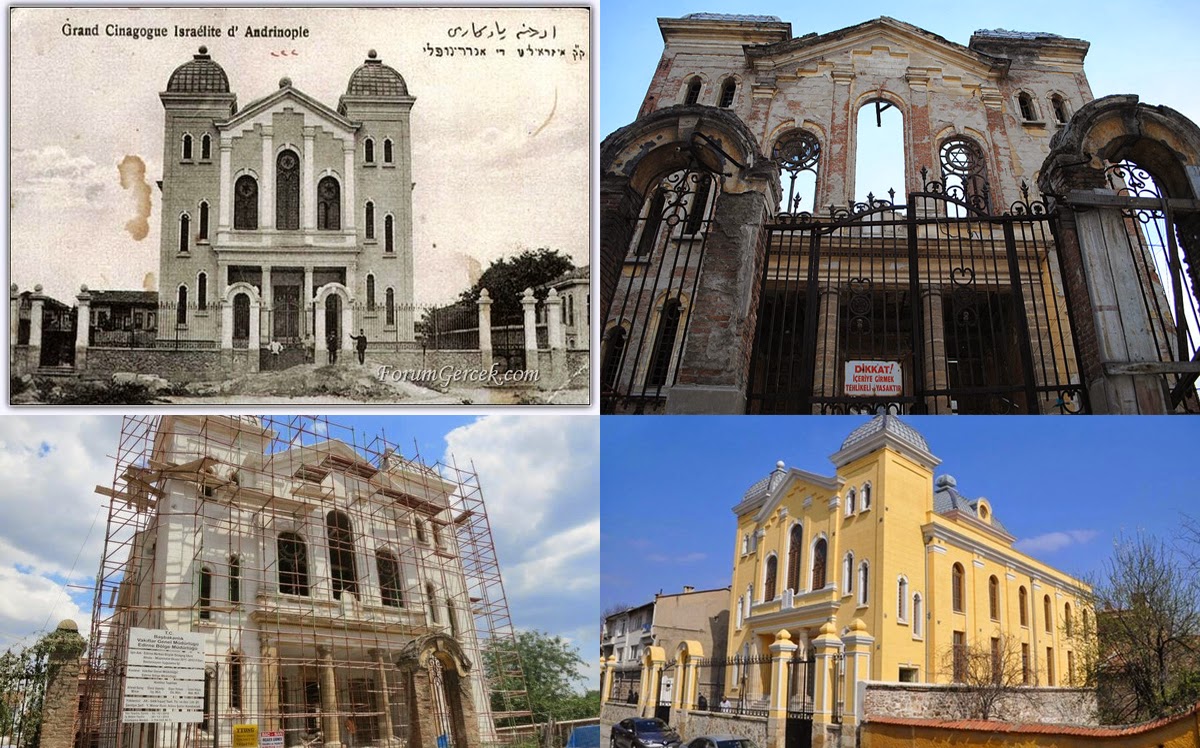
Different views of the Grand Synagogue of Edirne, Turkey, over the years. Collage via Salom Newspaper.
Naim Güleryüz wrote in his book, Tarihte Yolculuk: Edirne Yahudileri (A Journey to History: Edirne Jews) that the last wedding in the Grand Synagogue was made for Sara and Rifat Mitrani in 1976. Thus, the restoration and reopening of the synagogue were personally important to Mr. Mitrani: “My friends who migrated to Israel and gathered in the Tel Aviv’s Edirneliler Kulübü (Edirne Club) also came in [to Turkey for the synagogue commemoration] and they were excited as much as me. They brought their family photos which was taken 50 years ago in these streets and there was opened an exhibition at the entrance of the synagogue.”
Mr. Mitrani continued, “There was a Jewish community center in Tahtakale close to Kaleiçi, where the Jewish quarter of Edirne located. We gathered there as members of Jewish community but we also invited our Muslim friends to celebrate Muslim holidays and national holidays.”
As a last but the most special note for Seattle’s Sephardic community, we also spoke about badem ezmesi (almond paste – mogado in Ladino) during our interview. Mr. Mitrani says that Edirne is famous for this treat thanks to a tradition that Sephardic Jews introduced to the city. “All the chefs in Edirne today mastered the badem ezmesi at the hands of Jewish chefs. My sister-in-law still prepare it for special days.”
In 2010 when my friends came to Edirne, I stopped by the entrance of the synagogue and told them that even I remembered its roof and outer walls. I felt that I was walking around someone’s life, but could not tell her story due to the fact that I missed the chance to meet these people somewhere in this old city’s history. But some Sephardic memories are still alive in Edirne’s streets, and they are waiting to be discovered.
Links for Further Exploration
- Edirne Speech of the Turkish Jewish Community President, İshak İbrahimzadeh, 2015
- Interview: Award-winning author Maureen Jackson on Restoring Lost Voices in Sephardic Culture (2014)
- A Soldier’s Ladino Poems of Ottoman Jewish Pride (2014)

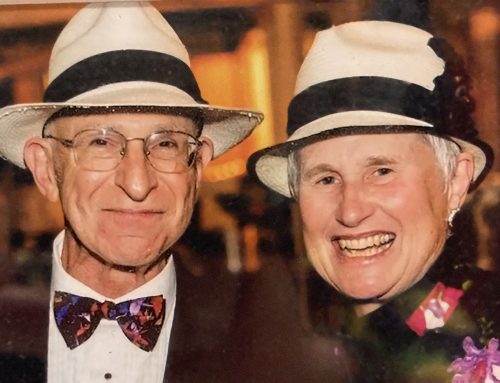
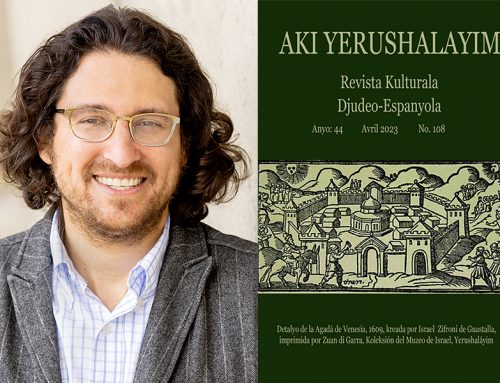
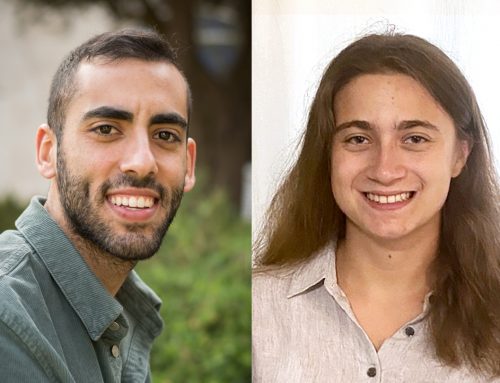
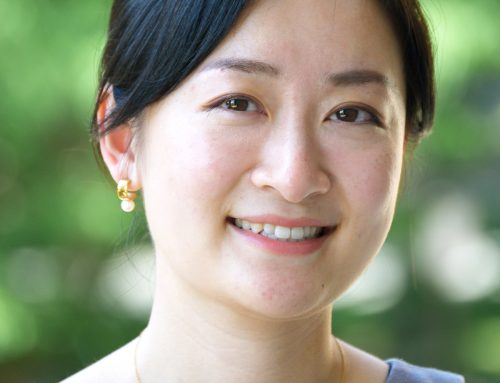
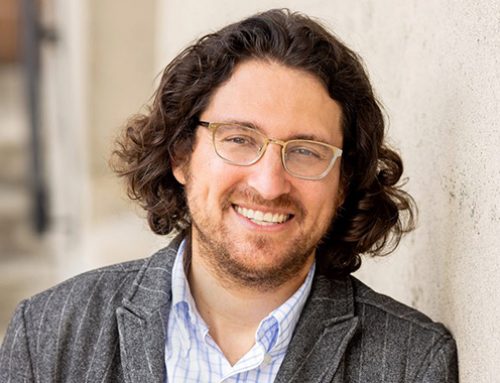
![Muestros Artistas [Our Artists]: Bringing Sephardic Art and Community Together at the UW](https://jewishstudies.washington.edu/wp-content/uploads/2023/08/UWJS_Muestros-Artistas-cropped-500x383.jpg)
Fascinating!
Dear Barkay,
I was in Edirne in 1990 and met Sara Mitrani, who took me and my friend to the synagogue (where she and Rifat were married in 1976) and through the old Jewish areas. If you are in touch with her, please give her my best regards.
Rachel Amado Bortnick.
Dear Rachel,
I will definitely tell your message to Mitrani family when I visit Edirne this summer.
[…] reading: This Jewish Studies article “Close to My Ancestors”–The Restored Grand Synagogue of Edirne, Turkey and this Reuters article, Turkey unveils Great Synagogue as Jewish population […]
Dear Berkay,
Thank you for this article. My family lived in Edrine after the Spanish inquisition, and migrated from there to Xanthi Greece but sadly were all murdered in the Shoah. My grandmother who moved to the Jewish part of Palestine, before the war and as far as we know was the only survivor. One family member (we don’t know her name) apparently moved back to Turkey to get married before the war an may be alive. I am trying to trace the family history and am also hopeful that someone else survived the war. The family name was Kouzy,(Not sure if that spelling was used in Turkey) and my great grandparents first names were Nissim and Soloutcha. They moved the family to Greece but I am hopeful that the Jewish cemetery in Edrine may have some family members who lived in Turkey prior to the move.
If you have any information at all I would greatly appreciate it or if you know anyone that may be able to help.
All the very best
Danny
Dear Berkay,
Although I am of Ashkenazi origin (Romania) grew up in Israel and live in USA, I studied and follow Jewish history of all its variation, particularly eastern Europe. Thank you for educating me about Edirne, because I am planning a trip to Turkey in October this year and this synagogue is on my visiting itinerary. I always enjoyed (in Israel) hearing the ladino sound and love the eastern/Turkish Jewish culture. I visited most cities synagogues and cemeteries in Romania and in other European countries too, and it saddens me the realization that so much was lost. I am looking forward to be able to visit Edirne’s synagogue.
Q: who is supporting the upkeep at present? does Turkish gov. has any input?
Thank you again.
Sara Yoel